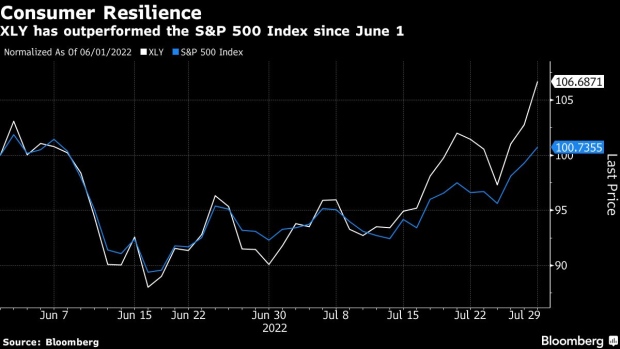Jul 29, 2022
Biggest Discretionary ETF Gets Lift by Cost-Conscious Consumers
, Bloomberg News

(Bloomberg) -- Fears of a recession and skyrocketing inflation aren’t reflected in an exchange-traded fund that tracks companies that provide non-essential goods.
The $15.2 billion Consumer Discretionary Select Sector SPDR Fund (ticker XLY), the largest US-listed consumer discretionary fund by market value, is performing much better than the S&P 500 Index since the start of June, according to Bloomberg data. In the last two months, XLY has climbed 6.6%, which includes a 18% rebound from a June 14 low. Meanwhile, the S&P 500 eked out a gain of 0.7% since June 1.
The recent selloff in consumer-discretionary stocks has put the sector on sale, positioning it to outperform the broader market, Morgan Stanley’s Andrew Slimmon told Bloomberg this week. The S&P 500 Consumer Discretionary Sector Index is down 21% this year.
Read more: Morgan Stanley’s Slimmon Recommends August Bargain Hunting
Meanwhile, consumers are seeing wage gains, with the Labor Department’s employment cost index, a broad gauge of wages and benefits, jumping 1.3% in the second quarter from the prior three months, beating economists’ estimates of 1.2%.
“Broadly speaking the retail consumer has been resilient, but the big shift here though, and this is what’s gotten so many goods sellers off guard, is we’re seeing a normalization of consumption patterns,” said Art Hogan, chief market strategist at B. Riley Wealth. “We’re going back to consuming more services than goods.”
While big-box retailers Walmart Inc., Target Corp. and Best Buy Co. just cut profit forecasts in their recent earnings reports, citing stockpiles of merchandise that consumers are not purchasing, Amazon.com Inc. bucked that trend Thursday when it reported second-quarter revenue that beat estimates and predicted sales would rise 17% in the current quarter. Amazon is XLY’s largest holding in terms of percentage weight at 23%.
But the pressure is on. Retailers face dwindling profit margins as massive inventory buildups reflect a consumer who is getting squeezed by inflation. According to Bloomberg Intelligence, retailer margins are already projected to reach their lowest second-quarter level since 2010 -- excluding 2020 -- and month-over-month inventory growth has consistently outpaced that of sales for the past four months.
“Retailing has some of the lowest revenue per employee as an industry group, meaning they are one of the most labor intensive industries, and they are likely struggling significantly as labor costs go up,” said Gillian Wolff, senior associate analyst at BI.
A number of retailers that make up XLY’s 59 holdings report second-quarter earnings next week. They include Starbucks Corp., EBay Inc. Marriott International Inc., Booking Holdings Inc. and MGM Resorts International. The reports will shed more light on spending and margins. Hilton Worldwide Holdings Inc., a part of XLY, reported quarterly earnings that beat analyst estimates and raised its full-year projections.
“Amazon was a revenue beat and they raised guidance for 3Q, whereas Walmart suggested that customers were substituting away from big-ticket items in favor of staples, which was going to hurt them,” said Michael Casper, an equity strategist with BI. “Most of the retailers are still yet to report though, so we’ll get a better read on some of this in a few weeks.”
©2022 Bloomberg L.P.





